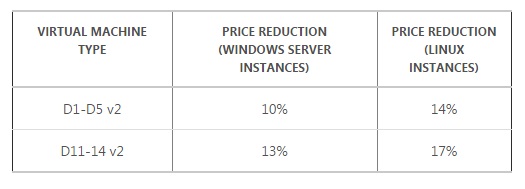Microsoft cuts Azure virtual machine prices up to 17 percent in response to Amazon

When Amazon chopped EC2 prices earlier this month, I wondered whether Microsoft would make good on its long-standing promise to match those cuts.
On January 14, Microsoft responded, announcing price cuts of up to 17 percent on its Azure D-series virtual machines, a k a Dv2 Virtual Machines.

Microsoft's latest Azure VM price cuts
Specifically, the cuts are up to 10 percent for Windows Server instances of D1 to D5 second-generation VMs and 14 percent for Linux D1 to D5 VM; and 13 percent for Windows Server instances of D11 to D14 VMs and 17 percent on the comparable Linux VMs.
Dv2 VMS have 35 percent faster CPUs than first-generation D machines, as they are based on the newest generation Intel Xeon (Haswell) processors, Microsoft officials said.
More from Microsoft's post announcing the latest reductions:
"It is worthwhile to note that the Azure Dv2 instances - unlike AWS EC2 instances - have load balancing and auto-scaling built-in at no additional charge. This means you get even more value from Azure. In addition to delivering great prices, we provide further discounting and more flexible purchasing programs to support your journey to the cloud."
Microsoft's post also notes that Azure VM usage is billed per-minute, unlike AWS, which bills per hour.
Amazon announced on January 5 it would reduce the prices of various on-demand and reserved instance prices, as well as dedicated host prices for various regions. Google officials still argue Google's cloud prices are cheaper than Amazon's.
Microsoft officials first said in 2013 they'd match Amazon cloud price cuts on commodity services, including compute, storage and bandwidth. Microsoft never announced plans to respond to Google's cloud pricing.